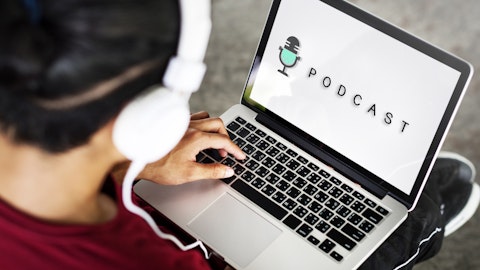Robert Ellin : Yes. I mean I would say the confidence is even higher. I mean, Sirius Radio bought a podcast network doing $10 million in revenues for $150 million in cash, only 6 months ago, right? And if anything, Spotify and Sirius’ stocks have gone up substantially. Spotify came back down a little bit, but they’re up very, very substantially from when that valuation was done. So if anything, the valuations have gone higher in the space. So we’re pretty excited about it. And I think the opportunity of acquiring small ones is that Spotify and Apple and Sirius and iHeart they’re not going to buy these little ones anymore. They’re just too small for them, right? They’ve gobbled up a tremendous amount. They have big, big market shares in these.
And I think it’s an exciting time for us to be able to roll the smaller ones up because there really is no home for them anymore. And as you know, you got Odyssey and Westwood. There’s a lot of debt out there amongst the radio companies that have built podcast networks. I think there’s a huge opportunity to consolidate this space and really grow it in for us. I think we’re the only game in town that can buy the small ones and do the things that Kit and his team do.
Sean McGowan : Makes sense. Circling around to splitmind. Can you just give us a little bit more color on this Madden deal, like this could be an example, right, of things that could happen. How does this work economically?
Robert Ellin : Yes. Great. So I’m going to hand that to Josh and I love the [indiscernible] because you and I have been — Sean, you and I have been in the trenches of the game business and watch how much money is generated. I love music inside of these games. My kids play Madden literally nonstop and it’s really exciting. So Josh, why don’t you jump in and talk about where that’s going, not just for games, but film, television, rein overall with the publishing side of our business.
Josh Hallbauer : Rob. I mean in general, publishing revenue comes from syncs and licenses. And I think that as we’ve got involved in this asset, we’re really already showing how much value we can add on making revenue from that side of the business. Madden is the most prized video game in the U.S. I think it actually is the highest selling video game in the U.S. or at least the highest selling sports game. And we’re track 1, we are the title track. We’re the one that’s on every commercial on all the Internet commercials and the nationwide commercials. And I think that, that mixed with the storing the music for the new Gerard Butler film Kandahar that just came out and doing the music for the Emmys last year, we’re on track to really continue to grow the publishing business more on the sync and licensing side of the business.
We’re always focused on creating hit songs that’s a given. That’s our daily life of actual music creation, but you can’t discount how much money you can really be making from the sync and licensing side. And as we grow, we’ll continue to have more assets to be able to put inside of making money on that side of the business.
Sean McGowan : I think this is such a high profile kind of almost like a first real public test case on this model. So can you — without getting into specifics of dollars or even in the percentages, but just kind of conceptually, how does this work? What’s the basis of the revenue that you get from that? And is it a flat rate? Is it the number of times the game is played, is there the number of times the music actually plays? What’s the basis of the revenue?


